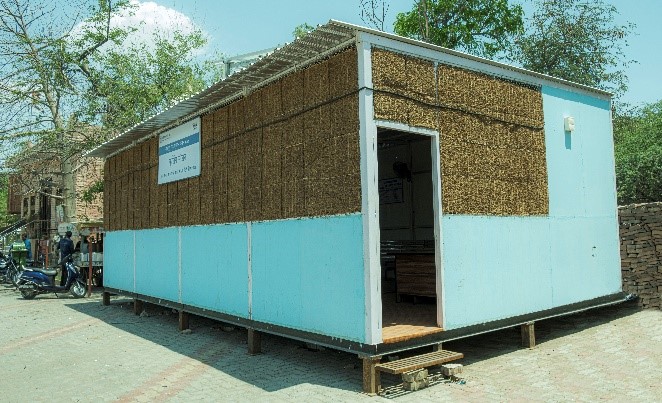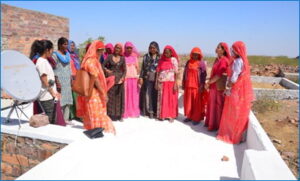
By Bindiya Patel, Programme Manager, Mahila Housing Trust and Aarohi Makdani, Development Associate (Urban Planner), Mahila Housing Trust, India

Jodhpur, like many other cities in India, confronts the terrible consequences of heatwaves, especially on its vulnerable populations. While heatwaves are a natural occurrence, their severity is compounded by urbanization, climate change, and inadequate infrastructure. Addressing this urgent issue requires a comprehensive strategy aimed at minimizing heatwave fatalities in Jodhpur.
In April 2023, Mahila Housing Trust (MHT) took a significant step towards climate resilience with the launch of the comprehensive ‘Jodhpur Heat Action Plan’ manual. Led by MHT, NRDC India, and Jodhpur Nagar Nigam North, this pioneering initiative lays the ground work for proactive measures to combat heatwaves and protect vulnerable communities.
Central to the Heat Action Plan is a multi-faceted approach that begins with a thorough Vulnerability Assessment. This assessment identifies high-risk areas and populations, enabling targeted interventions where they are most needed. Additionally, a robust Early Warning System, bolstered by interagency coordination, ensures timely alerts and efficient resource mobilization during heatwave emergencies.
At the local level, preparedness within health and education departments strengthens community resilience and enhances the capacity to respond to heat-related health risks. Capacity-building initiatives in the health system equip healthcare professionals with the necessary skills and resources to provide prompt medical assistance during heatwaves. Moreover, public awareness campaigns and community outreach activities raise awareness about heatwave risks and empower individuals to adopt preventive actions. MHT also plays a crucial role in supporting vulnerable communities by implementing preventive and adaptive measures like installing cool roofs. With over 1500 households in slum communities painted with reflective coatings, these roofs serve as a vital defence against scorching temperatures, reducing indoor heat stress and promoting sustainable urban development.
These cool roofs with solar reflective coatings, serve as a barrier against the scorching temperatures, significantly reducing indoor temperatures and alleviating the heat stress experienced by residents. By implementing such measures, MHT not only enhances the resilience of vulnerable communities but also fosters sustainable urban development.
Collaboration with non-governmental organizations and civil society fosters inclusive and participatory approaches to heatwave preparedness. By leveraging community networks and resources, these partnerships support vulnerable populations and enhance overall resilience.
Continuous evaluation mechanisms ensure that interventions remain effective and responsive to evolving challenges. Impact evaluations drive continuous improvement, ensuring that strategies to mitigate heatwave-related risks are continuously refined and optimized.
One of the crucial initiatives under the Heat Action Plan is the introduction of the ‘Net-Zero Cooling Station’ for the Informal Sector. Developed collaboratively by MHT and Jodhpur Nagar Nigam North, this innovative station is a crucial step in preventing heat-related fatalities among the city’s vulnerable populations. Equipped with integrated mist sprinklers and solar panels, the station efficiently reduces temperatures while operating sustainably. Its innovative design includes a wind tower for natural airflow and transparent façades for safety and community engagement. Providing essential amenities such as drinking water, ORS, and first-aid kits, the station prioritizes the well-being of its users. Constructed with durable Bison and Khas panels, it ensures longevity, symbolizing resilience in the face of climate challenges. The cooling station has successfully reduced internal temperatures by approximately 5-6 degrees, showcasing its effectiveness in providing relief during extreme heat events.
As part of the broader plan to mitigate avoidable heatwave deaths, the Cooling Station serves as a testament to collaborative efforts and community-driven solutions. It offers hope for a safer and more equitable future in Jodhpur, demonstrating the effectiveness of proactive measures in safeguarding vulnerable communities against the impacts of extreme heat events.
Disclaimer: The views expressed in this piece are those of the author/s and do not necessarily reflect the views or policies of AIDMI.